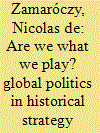|
|
|
Sort Order |
|
|
|
Items / Page
|
|
|
|
|
|
|
| Srl | Item |
| 1 |
ID:
155291


|
|
|
|
|
| Summary/Abstract |
Building upon current interest in studies of how popular culture relates to global politics, this article examines one hitherto overlooked aspect of popular culture: computer games. Although not prominent in the field of International Relations (IR), historical strategy computer games should be of particular interest to the discipline since they are explicitly designed to allow players to simulate global politics. This article highlights five major IR-related assumptions built into most single-player historical strategy games (the assumption of perfect information, the assumption of perfect control, the assumption of radical otherness, the assumption of perpetual conflict, and the assumption of environmental stasis) and contrasts them with IR scholarship about how these assumptions manifest themselves in the “real world.” This article concludes by making two arguments: first, we can use computer games as a mirror to critically reflect on the nature of contemporary global politics, and second, these games have important constitutive effects on understandings of global politics, effects that deserve to be examined empirically in a deeper manner.
|
|
|
|
|
|
|
|
|
|
|
|
|
|
|
|
| 2 |
ID:
172165


|
|
|
|
|
| Summary/Abstract |
Militaries around the world have benefited from computerized games. Many recruits have been attracted to the military through military-style video games. After recruitment, games and simulations provide an important means of soldier training, including before actual deployments. However, electronic games are lacking for UN peace operations. The multidimensionality of peacekeeping has yet to be simulated in serious games to complement the many games that too often depict a binary battlefield of blue-team versus red-team (or, often in public games, good versus evil). Not only could soldiers benefit from nuanced and ambitious peace-related games, so too could civilian peacekeepers, and the public at large. Peacekeeping gaming should not be merely at the tactical level; the operational and strategic levels can be gamed as well. The decision-making in future peacekeeping simulations could help instruct conflict-resolution and critical thinking skills. The paper posits that such digital games could be an important tool for current and future peacekeepers, both military and civilian. Commercial games could also help educate the public on UN peacekeeping. The paper suggests that the United Nations partner with some member states and perhaps the video game industry to provide in-depth training simulations that mirror the challenges and complexities of modern peace operations.
|
|
|
|
|
|
|
|
|
|
|
|
|
|
|
|
| 3 |
ID:
148676


|
|
|
|
|
| Summary/Abstract |
Digital games are among the most popular forms of entertainment media. Despite their ubiquity, the fields of political science, International Relations, and political communication have generally overlooked the study of digital games. We take up this void by examining the international enemies depicted in combat games – specifically, first-person shooter (FPS) games – which can speak to the process in the construction of international threats in society. Our review of framing the enemy gleans perspectives from multiple disciplines including International Relations, political communication, and digital gaming. Our empirical analysis traces the evolution of images in digital games from 2001 to 2013 to reveal the identity of the enemies and protagonists and to examine the context of the game – including the setting where each game takes place. We find that Russians are a popular form of enemy in FPS games even after considering terrorists as a broad category. Our review of the literature and our empirical analysis together present a foundation for the future study of digital games as a process of framing of enemies and transmission of threats.
|
|
|
|
|
|
|
|
|
|
|
|
|
|
|
|
|
|
|
|
|